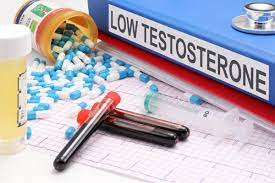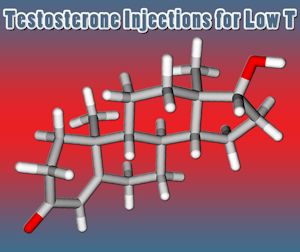Testosterone is intrinsically essential to men's health. In fact, Low Testosterone is connected to a wide range of physical and mental health issues which deplete  the quality of life and increase the risk of early mortality.
the quality of life and increase the risk of early mortality.
Testosterone plays an indispensable role in sexual function, skeletal strength, immune health, memory, confidence, and more. Most people easily comprehend the sexual importance of Testosterone and how it stokes libido and supports erectile health.
Men also understand that Testosterone is linked with strength and muscle mass. Without enough Testosterone, you not only lose lean muscle and struggle with sexual dysfunction but are also at increased risk of Diabetes, Heart Disease, Alzheimer's, and Osteoporosis.
Low-T is also associated with severe exhaustion and fatigue. Many men turn to Prescription Testosterone not to correct sexual woes but to restore lost energy and vitality.
Ideal Testosterone Levels range anywhere from 300-1000 ng/dL. The closer you  get to that 300 threshold, the more likely you will experience symptoms of Testosterone Deficiency, especially if you engage in a lifestyle that discourages optimal Testosterone Production.
get to that 300 threshold, the more likely you will experience symptoms of Testosterone Deficiency, especially if you engage in a lifestyle that discourages optimal Testosterone Production.
In order to know when to see a Men's Health Clinic or other HRT Specialist, it's vital to recognize the various contributing factors that lead to the diagnosis of Testosterone Deficiency.
Dynamics Which Diminish Testosterone and Increase the Risk of Low-T
- Age is strongly correlated with Testosterone Levels. As you get older, your natural propensity to produce Testosterone falls slowly over time—the odds of experiencing Low-T increase with every year, beginning around age 30. Because of aging and genetics, every man has a maximum amount of Testosterone they can produce for their age. All other negative factors make it harder to reach this maximum. After a certain point, all the lifestyle changes in the world may no longer be able to support healthy Testosterone Levels.
- Injury can increase the risk of Low-T. The testes are the engine of Testosterone Production. If they experience damage, whether through blunt injury, chemotherapy, or from some other harmful source, this will interfere with their ability to make Testosterone. Your Hypothalamus and Pituitary Gland are also important because they receive and send signals that your body needs Testosterone. Any damage to these parts of the brain can affect upstream signals for Testosterone.
- Weight influences Testosterone Levels. It's crucial to have a healthy balance between muscle and fat. Fat cells have the ability to convert Testosterone into Estrogen. This isn't harmful—it's actually beneficial—to a point. The more body fat you carry, the faster your fat cells deplete circulating Testosterone. If you're overweight and feel the likely effects of Low-T, losing weight can help restore Hormone Balance. Being underweight can also adversely affect Testosterone. Your body prioritizes the resources that you take in through diet. Survival comes first. That's actually why we tend to put on weight so easily. If you are too thin, your body will redirect resources from Testosterone Production and into other processes meant to keep you alive and functional at the expense of your long-term health and Hormone Balance.
- Alcohol and certain other drugs can impair Testosterone Production. Alcohol obstructs your ability to produce Testosterone at multiple levels, from the Hypothalamus to the Testes. It also increases the natural production of Estrogen, which further contributes to Hormone Imbalance. The severity of Alcohol use and abuse is correlated with the intensity of Testosterone Deficiency. Other drugs such as Opiates, Statins, and certain Antidepressants can also lower Testosterone
- Chronic Stress increases Low-T Risk. As we mentioned earlier, your body has to maintain a balancing act to keep you happy and healthy. It wants you to live a long time, but it also wants you to survive and navigate the dangers of everyday life. Cortisol is the fundamental hormone that controls the stress response. Cortisol triggers fight-or-flight and diverts resources from baseline function to help you overcome immediate obstacles. Chronic stress is one of the follies of human evolution.
Cortisol is made from the same building blocks as Testosterone. Remaining in a state of Chronic Stress takes away your ability to produce enough Testosterone and can lead to feelings of profound exhaustion and fatigue, along with immune burnout.
Restoring Testosterone Levels for Good Health
While there's no cure for aging, there's still a lot that you can do to maximize your ability to produce Testosterone:
- Maintain a healthy body weight
- Take up weight lifting or resistance training
- Meditate, make an appointment with a counselor, or take other measures to get Stress under control
- Make a concerted effort to get a good night's sleep (ideally 7-9 hours)
- Eat a well-balanced diet high in protein, healthy fat, and other nutrients—Low in simple carbohydrates.
- Limit your exposure to Alcohol and other offending recreational drugs
If you feel that you're doing everything you can to maintain healthy Testosterone Levels but still feel you are falling short, there's no reason to beat yourself up. It's perfectly natural for some men to struggle with Low-T; it literally affects millions of men nationwide.
perfectly natural for some men to struggle with Low-T; it literally affects millions of men nationwide.
Be proactive and reach out to a specialist! Contact us for a FREE, no-obligation discussion concerning the benefits of Testosterone Replacement Therapy (TRT).
Contact Us Today For A Free Consultation

- Question: What Makes Men Sexy to Women? Answer: Low Stress, High Testosterone, Strong Immunity - Testosterone Therapy [Last Updated On: June 17th, 2024] [Originally Added On: February 29th, 2020]
- Low Testosterone Levels Cause Health Woes -- Testosterone Prescription [Last Updated On: May 14th, 2024] [Originally Added On: March 11th, 2020]
- Co-Sleeping with Baby Drops Men’s Testosterone Levels [Last Updated On: June 6th, 2024] [Originally Added On: March 21st, 2020]
- A Great Way to Boost Your Testosterone? Get Married! [Last Updated On: December 17th, 2023] [Originally Added On: April 1st, 2020]
- Five Myths About Low Testosterone And Testosterone Therapy — Testosterone Prescription [Last Updated On: April 29th, 2024] [Originally Added On: April 8th, 2020]
- Testosterone Reduces Group Think, Cooperation, and Less Sheep-Like Mentality [Last Updated On: August 8th, 2024] [Originally Added On: April 25th, 2020]
- Testosterone, Viagra not a winning combination for erectile dysfunction - Testosterone Prescription [Last Updated On: November 25th, 2024] [Originally Added On: April 30th, 2020]
- A Disturbing Trend: Testosterone Levels Falling Even Lower in Adolescent Males [Last Updated On: August 17th, 2024] [Originally Added On: May 31st, 2020]
- Low-T: Men With Low Testosterone Found More Likely to Die From COVID-19 AKA Coronavirus [Last Updated On: August 21st, 2024] [Originally Added On: June 12th, 2020]
- The Effects of Hypogonadism on Men and How to Fix It: Testosterone Replacement Therapy [Last Updated On: January 17th, 2024] [Originally Added On: June 14th, 2020]
- Testosterone Drives Ego, Reduces Cooperation — Testosterone Prescription [Last Updated On: February 29th, 2024] [Originally Added On: November 2nd, 2020]
- Testosterone Linked to Heart Disease -- Testosterone Prescription [Last Updated On: April 13th, 2024] [Originally Added On: November 18th, 2020]
- Acidosis: The Hidden Health Destroyer [Last Updated On: July 4th, 2024] [Originally Added On: January 20th, 2021]
- Testosterone Therapy Could Lower Diabetes Risk for Men – The Science is Promising! [Last Updated On: September 7th, 2024] [Originally Added On: February 19th, 2021]
- Who Would Have Thought? The Moon’s Cycles Affect Men’s Hormones Too! [Last Updated On: January 13th, 2024] [Originally Added On: April 23rd, 2021]
- Testosterone replacement therapy improves symptoms of metabolic syndrome - Testosterone Prescription [Last Updated On: November 24th, 2024] [Originally Added On: April 24th, 2021]
- The top ten testosterone booster supplements: A review [Last Updated On: November 12th, 2024] [Originally Added On: April 27th, 2021]
- Increase in testosterone drug use - Testosterone Prescription [Last Updated On: November 16th, 2024] [Originally Added On: April 29th, 2021]
- Men with higher testosterone tend to lie less, study suggests [Last Updated On: May 8th, 2024] [Originally Added On: April 30th, 2021]
- Environment trumps genes in testosterone levels, study finds - Testosterone Prescription [Last Updated On: November 13th, 2024] [Originally Added On: May 2nd, 2021]
- Testosterone shown to help sexually frustrated women- Testosterone Prescription [Last Updated On: November 18th, 2024] [Originally Added On: May 3rd, 2021]
- Testosterone therapy — good idea or not? - Testosterone Prescription [Last Updated On: November 24th, 2024] [Originally Added On: May 5th, 2021]
- With testosterone, it's 'my way or the highway': UK study - Testosterone Prescription [Last Updated On: November 17th, 2024] [Originally Added On: May 9th, 2021]
- Too much testosterone makes for bad decisions, tests show - Testosterone Prescription [Last Updated On: November 25th, 2024] [Originally Added On: May 10th, 2021]
- Your Life on Testosterone: Overly Sure, Unwilling to Listen to Anyone [Last Updated On: February 4th, 2024] [Originally Added On: October 17th, 2021]
- Study Investigates the Effects of Democratic Outcomes on Testosterone Levels [Last Updated On: July 26th, 2024] [Originally Added On: March 30th, 2022]
- Testosterone and Human Behavior: Hormone Promotes Prosocial Behaviors [Last Updated On: October 4th, 2024] [Originally Added On: August 15th, 2022]
- Guide to Boosting Your Testosterone Levels Naturally [Last Updated On: October 10th, 2024] [Originally Added On: August 16th, 2022]
- Testosterone for TRT Could Someday Be Supplied from a Single Skin Cell [Last Updated On: October 9th, 2024] [Originally Added On: September 5th, 2022]
- The Testosterone Controversy: To Take or not to Take? [Last Updated On: October 20th, 2024] [Originally Added On: November 8th, 2022]
- Think Testosterone is for Men Only? THINK AGAIN! [Last Updated On: October 14th, 2024] [Originally Added On: November 16th, 2022]
- Testosterone Recruits Immune Cells That Fight Cancer [Last Updated On: September 4th, 2024] [Originally Added On: November 22nd, 2022]
- Kevin Nash Defends The Rock’s PED Use after Joe Rogan’s Comments [Last Updated On: November 1st, 2024] [Originally Added On: December 15th, 2022]
Word Count: 861




















